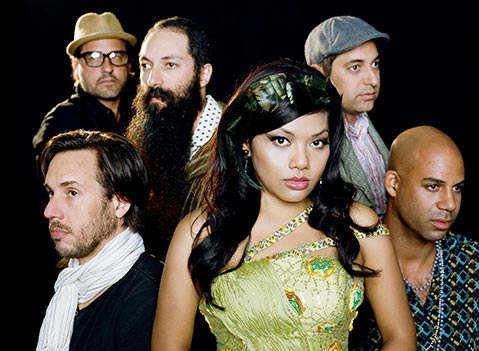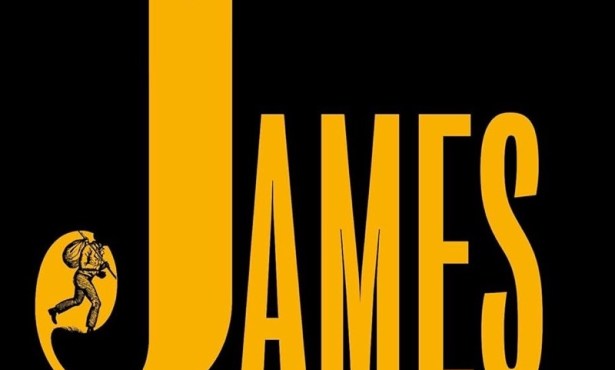Dengue Fever Takes the Plunge
The L.A. Cambodian Pop Act Launches Its Own Record Label

After 14 years together, Los Angeles–based Khmer pop band Dengue Fever has just released its fifth full-length album of all new material, titled The Deepest Lake. It’s a grower that expands the band’s already awesome mulligan stew mélange of psychedelic, surf, and ’60s Cambodian pop music by adding choice bits of Afro percussion, Latin grooves, Khmer rap, layered Stax-style horns, and even boy/girl vocals in the John Doe/Exene Cervenka tradition.
The band’s origin dates back to 2001, when keyboardist Ethan Holtzman returned from a six-month Cambodian sojourn. During his time overseas, Holtzman discovered the wonders of ’60s Cambodian pop music, specifically vocalists like Pan Ron, Ros Sereysothea, and Sinn Sisamouth. Together these musicians synthesized elements of the au courant American- and British-originated surf, garage, and psychedelic music percolating around the globe at the time, mixing it with their own Khmer traditional-music sensibility to create a sound that was all the rage in Phnom Penh. Tragically, the brutal dictatorship of Pol Pot forbade this music, and many of its makers were killed in the Khmer Rouge of the 1970s, leaving a secret treasure trove of contraband vinyl and cassettes in their wake.
Two decades later, these hidden treasures made their way to Holtzman, who returned from his trip with beaucoup Cambodian cassettes. Back in Southern California, Holtzman recruited his brother, guitarist/vocalist Zac Holtzman to form a neo-Khmer pop band. Together the brothers brought in lead singer Chhom Nimol, whom they spotted singing in a nightclub in the Little Phnom Penh district near Long Beach. Bassist Senon Williams (Radar Brothers), drummer Paul Smith, and saxophonist David Ralicke (Beck/Brazzaville) were recruited soon after.
Although they initially covered the lost classics in Khmer only, the band now composes its own original tunes, some of which are translated from English to Khmer for Nimol to sing traditionally and some of which are sung by Nimol and Zac Holtzman in English. The group gained traction in Cambodia and throughout the world after the 2007 release of the documentary film Sleepwalking Through the Mekong, which featured the band touring in Nimol’s homeland. The band has also supported Cambodian Living Arts, Wildlife Alliance, the Sweet Relief Fund, and other charitable organizations. Additionally, Dengue Fever won the best World Fusion Album category at the 2009 Independent Music Awards. Iconic rock luminaries such as Kirk Hammett, Peter Gabriel, and Ray Davies have also sung the group’s praises.
I recently spoke by telephone with bassist Williams in advance of Dengue Fever’s March 13 gig at SOhO. We spoke about the band’s new record and the fact that they now have their own DIY label, Tuk Tuk Records, which puts them in the enviable position of having creative control while effectively freeing them from the labyrinth of corporate politics that so many bands fall victim to. As Williams mentioned, this can be both a blessing and a curse because if the band succeeds, they’ve done it on their own terms, but if they fail, there’s no one else to blame. They’re also now potentially in a position to pay it forward and produce and distribute albums by other artists they feel an affinity for. On the group’s creative process, Williams cited real-life influences, such as the song “Golden Flute,” which was based on a real incident in which a mysterious flute was found by Zac Holtzman and returned to its rightful owner, which in turn led to said grateful owner bestowing a different flute to Holtzman, which ultimately lead to a love connection.
On the topic of incorporating hip-hop into the mix, Williams said the band did once run across a Long Beach–based Cambodian-American rapper named Prach Ly, who raps about Cambodian history and the Killing Fields. While Nimol herself does a bit of rapping on The Deepest Lake, there are currently no plans to bring in other guest artists, said Williams. On a deep-groove level, Williams’s bass influences include Larry Graham (Sly and the Family Stone), Noel Redding (The Jimi Hendrix Experience), James Jamerson, and Jah Wobble (PiL). Williams also mentioned that Lake has been well received but was challenging to make, as the band went with a more raw approach and a more expressive style. Still, the consensus is that Nimol and her passionately powerful vocals rose to the occasion, especially on the intimate tracks “Tokay,” “Cardboard Castles,” and “Deepest Lake on the Planet.” He went on to say that the band might bring some Turkish musical influences into the next project, and that they’re all excited to return and play for Santa Barbarans again. If you’ve yet to catch them live, I recommend grabbing some Mekong whiskey and some friends and taking the plunge into Dengue Fever’s Lake this Friday the 13th. Their show is not to be missed.
4•1•1
Dengue Fever plays SOhO Restaurant & Music Club (1221 State St.) on Friday, March 13, at 9 p.m. Call (805) 962-7776 or visit sohosb.com for tickets and info.



